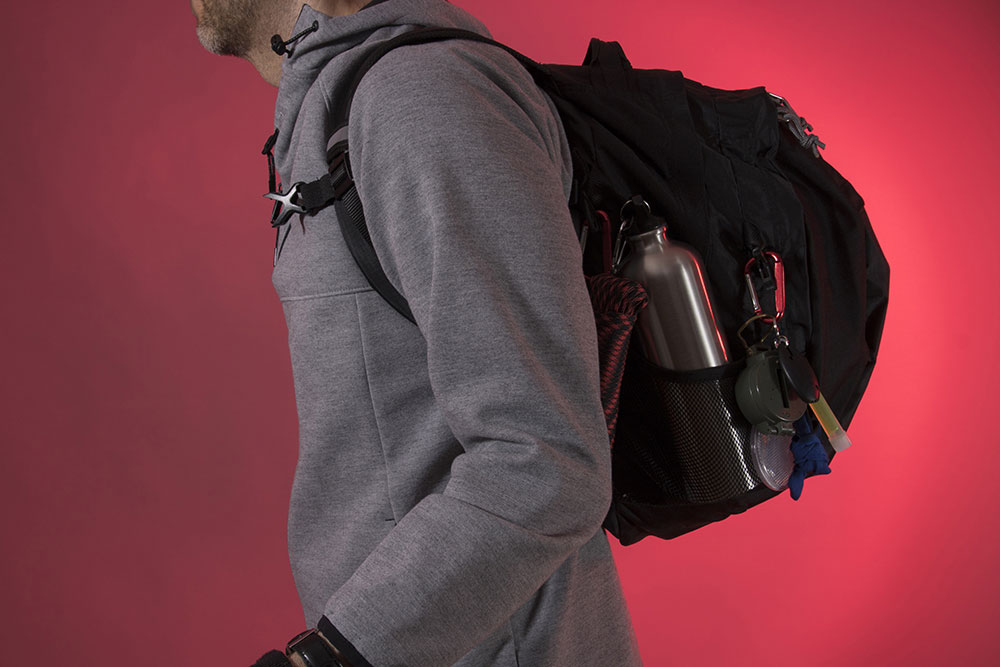DAYPACKS ALLOW YOU TO CARRY ALL YOU REALLY NEED. WHAT’S IN YOURS?
STORY AND PHOTOS BY STEVEN PAUL BARLOW
You have a limited number of pockets with limited capacity. And once you fill those pockets and available belt real estate with typical everyday carry items – keys, phone, flashlight, lighter, knife, and your defensive tools of choice – you’re likely to have no room left for other items you might have to take along on any particular day.
Enter the daypack.
The daypack is nearly universal.
Just about everyone has one. Children use them to carry their books to school, commuters stow their laptops in them, hikers pack their lunches and water bottles in them. As the name implies, the daypack is intended to carry the things you might need short term – just for the day. It’s not a suitcase or large backpack that you’d normally use for multi-day excursions.
Yet for me, and I suspect many others, the daypack carries the items needed if my day takes an unexpected slide, and a sprained ankle, a wrong turn or a mechanical breakdown transforms my day into an extended ordeal. Even when I do carry additional luggage, often the daypack comes along to carry the essential items I want to keep close at hand for fast, easy access.
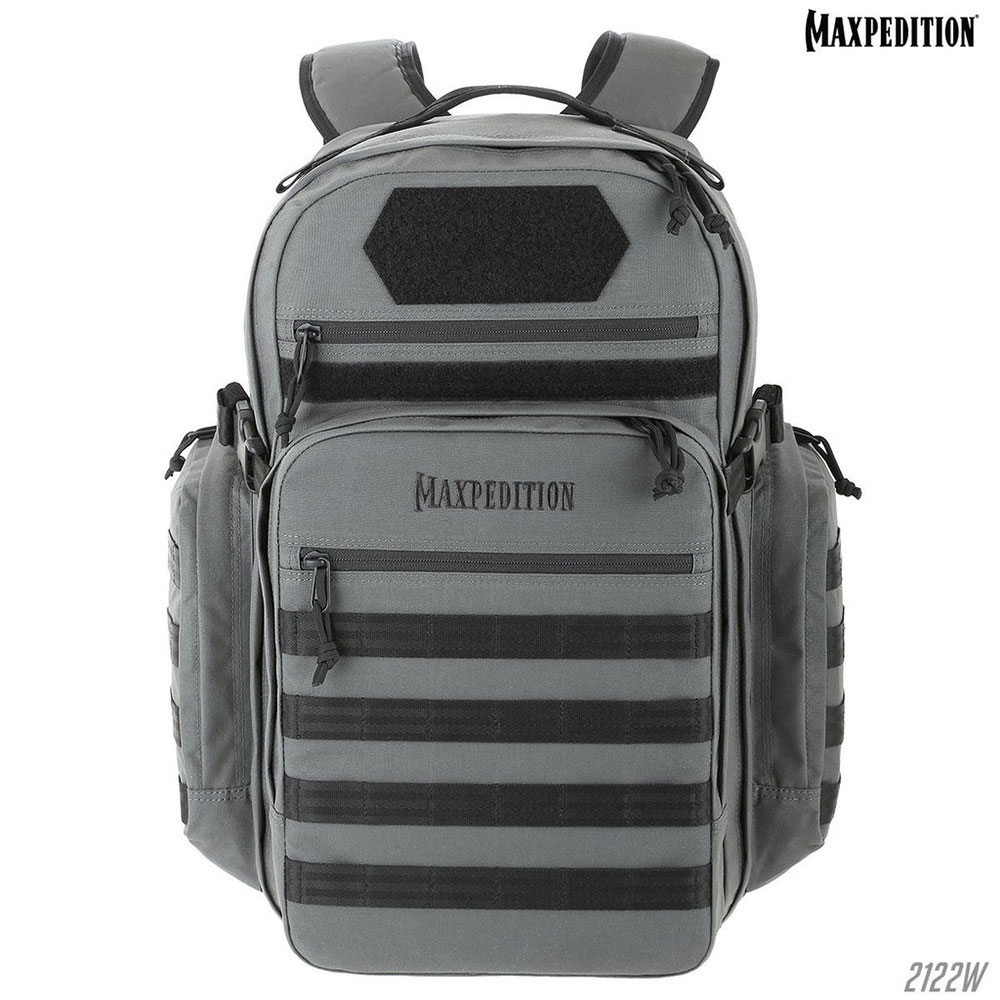
MAXPEDITION HAVYK-2
I’ve used packs by Voodoo Tactical and 5.11 Tactical with good results. Another pack I’ve been using lately that meets most of my requirements is the new Maxpedition Havyk-2 Backpack. It’s part of the company’s Legacy Series. I like this pack a lot and it has a good, 38-liter capacity. (They do offer a slightly smaller 32-liter version too.)
The Havyk-2 (pronounced Havoc) is made of 500-denier ballistic nylon triple-coated polyurethane for water and grime resistance and is double-stitched at stress points. It features a large main compartment with laptop sleeve and a full-length fuzzy panel inside for mounting hook-and-loop accessories.
There are two long, side accessory compartments, one on each side. Each is large enough to hold a typical Nalgene water bottle. On the outside front of the pack are three additional compartments. A small one near the top is perfect for such things as sunglasses, phones, and GPS units. A mid-sized one would make an excellent map pocket, with room for some snacks. The larger outside compartment features mesh organizer pockets on the inside. All of the pockets inside and out have sturdy, YKK zippers.
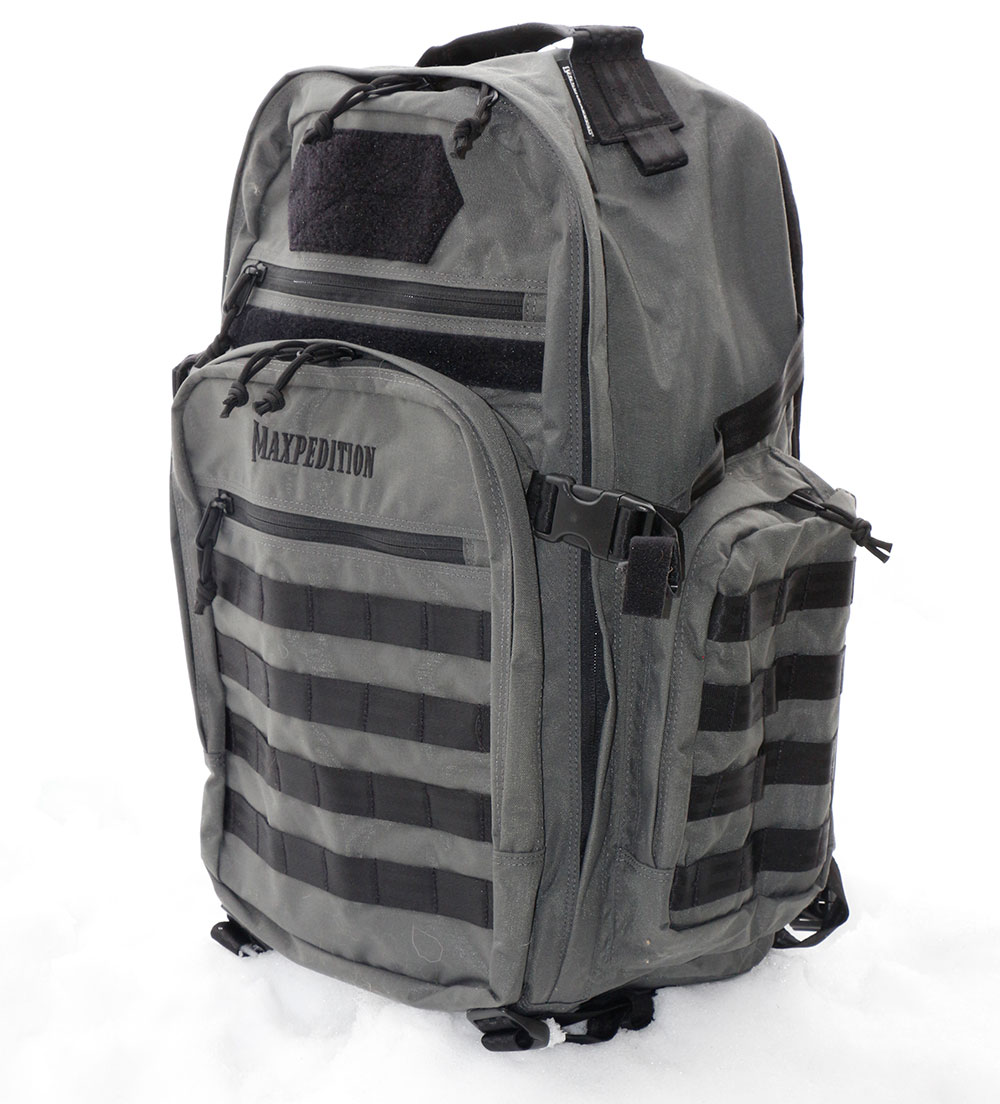
A nice compartment not readily apparent to the casual observer is the concealed carry weapon compartment on the back of the pack. It has zippered access from either side of the pack and you can reach this compartment easily while wearing the pack.
The front and sides of the pack feature ample MOLLE webbing for attaching additional pouches and gear. There are compression straps on the sides and bottom that can be used as attachment points as well.
The back of the pack – where it hits my back – is nicely padded. The padded shoulder straps are contoured and comfortable. There is a sternum strap to keep the straps in place. There is no padded hip belt – one’s not really needed on a pack this size – but there is a waist strap with quick-release buckle. This helps to keep the pack stable as I’m moving. The waist strap is removable too.

When using daypacks as carry-ons for air travel, I’ve often cursed ones that have large padded hip belts, long straps and huge buckles that seem to get snagged on everything as you’re getting on and off the plane or when trying to stow the pack under the seat.
This Maxpedition pack has a strong, reinforced carry handle on top and there are places for morale patches as well. There is no port for a water bladder hose, but I can live without one.
START WITH ESSENTIALS
So what do I carry in my daypack?
Aside from specialized circumstances requiring me to pack specialized gear, there are some essentials that stay in the pack always. Well, “always” means unless I’m flying, which I seldom do anymore, preferring instead to drive across country if necessary to avoid the scrutiny that I’d face when traveling with the masses.
I have a heavy-duty resealable bag that contains small survival items, such as a Swiss Army Knife (Hiker model with saw blade), Streamlight Protac 1AAA flashlight, Exotac fire starters (NanoSPARK, NanoSTRIKER XL, QuickLIGHT tinder), Exotac RipSPOOL repair kit, whistle, assorted adhesive bandages, antiseptic ointment, water purification tablets, small spork, compass, and insect repellent. If for some reason I have to ditch my pack, that kit can go into the cargo pocket of my pants. The heavy duty plastic bag will hold more than a quart of water.
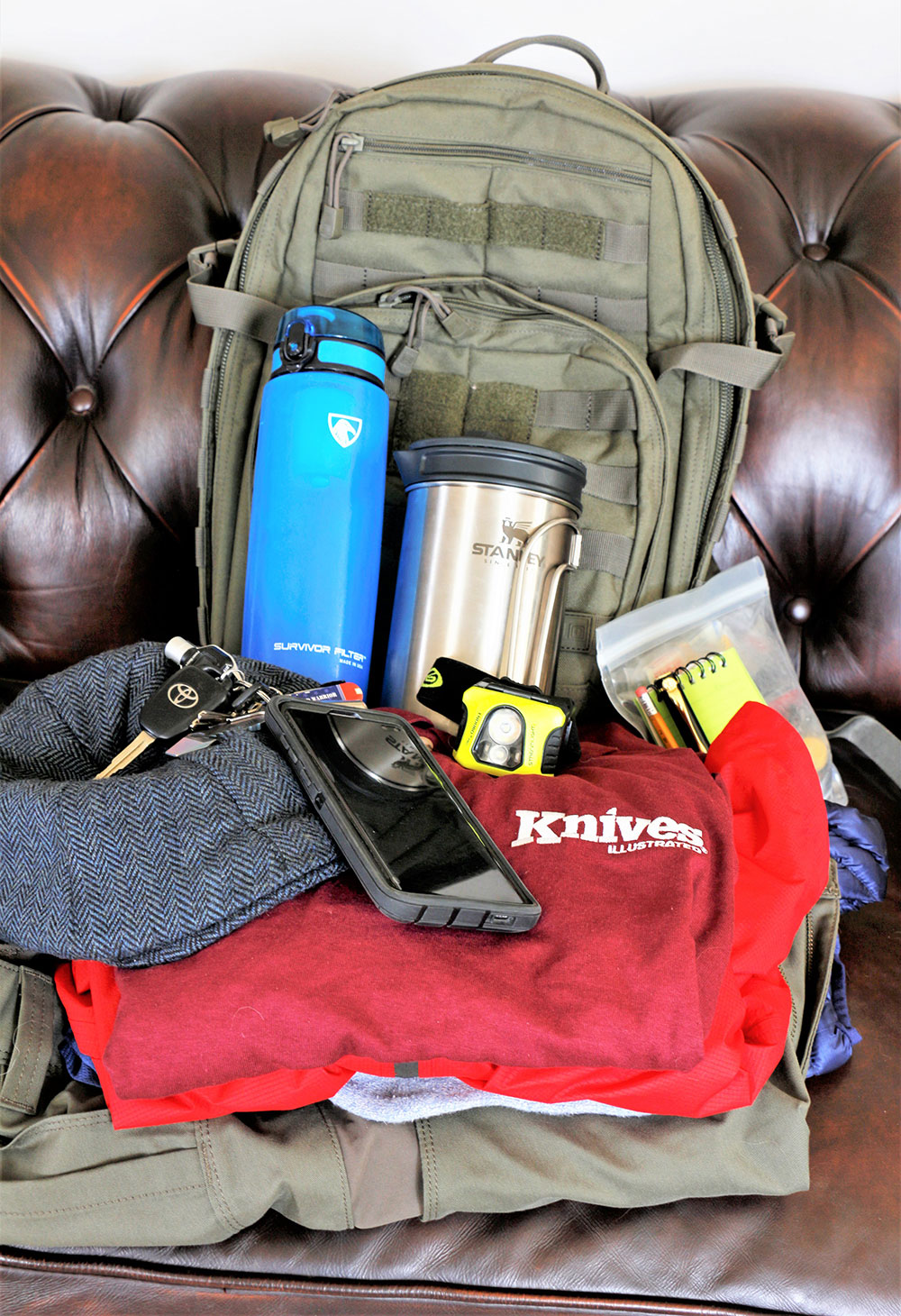
Also without fail, I carry a water bottle that nests in a steel cup. Often the bottle is equipped with a Survivor Filter water filter or a rechargeable Roving Blue GO3 purifier that screws onto a Nalgene bottle. At the minimum, I carry a few tea bags that help to improve the taste of strange water, and several energy bars. I have a 50 feet of paracord, an emergency blanket, a homemade alcohol stove, and a toilet kit with paper or wipes, toothbrush, tooth paste, hand sanitizer and a small microfiber towel.
I can’t forget the electronics. I pack a charge cord that will work for my phone and any rechargeable flashlights or other electronic gizmos I might have in my pack or pockets. I’ll have both AC and DC plugs for the cord and a small battery pack. I’m usually pretty frugal with my phone – I’m not talking, texting or posting much with it and rarely streaming or downloading. A thumb drive stores important documents.
All that might sound like a lot of things to tote, but most of those items are small and don’t take up that much space. That leaves me with plenty of room for situation specifics.
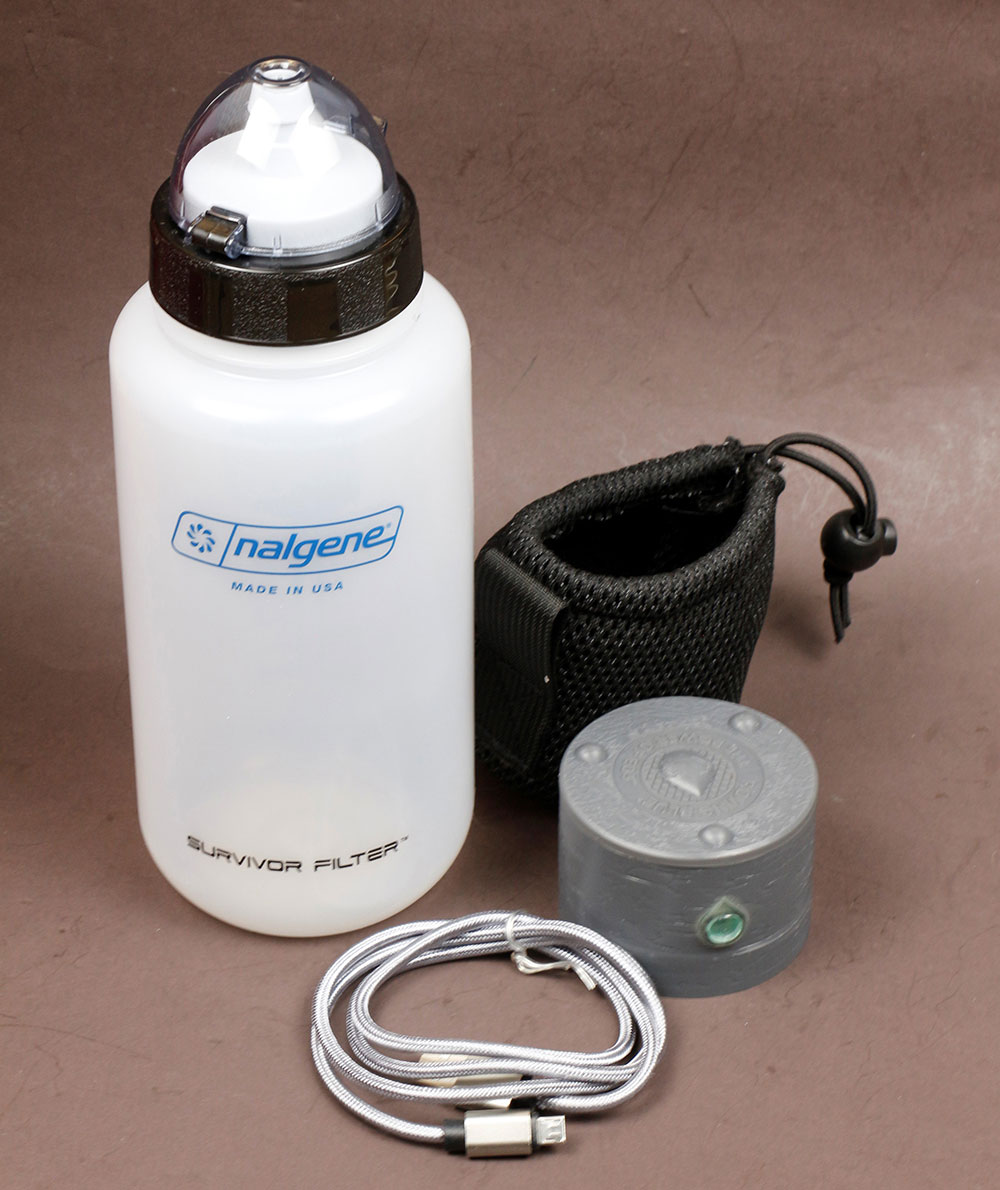
CONSIDER THE MISSION
Naturally, some of my pack’s contents will vary according to what I have planned for the day. If I’m taking a long road trip, my pack will have a least one full change of clothes – shirt, pants, underwear, sock – in case I get separated from my other luggage. I usually have some sort of lightweight raincoat or windbreaker and a down jacket in there too.
If I’m hiking or hunting, I’m more likely to pack more food and water, spare ammo, binoculars, maps, and a handheld GPS. Instead of a raincoat, I’ll usually have a poncho that I can wear, drape over a log for a dry place to sit, use as a ground cloth or improvise into a shelter.
Often I’ll pack a small .22LR or .22WMR handgun with extra ammo. A .22 is my choice for the pack because it’s small, lightweight and lots of ammo can be carried in a small space. Remember too that this is a secondary weapon to what I’m already carrying either openly while hunting or concealed on my person while hiking.
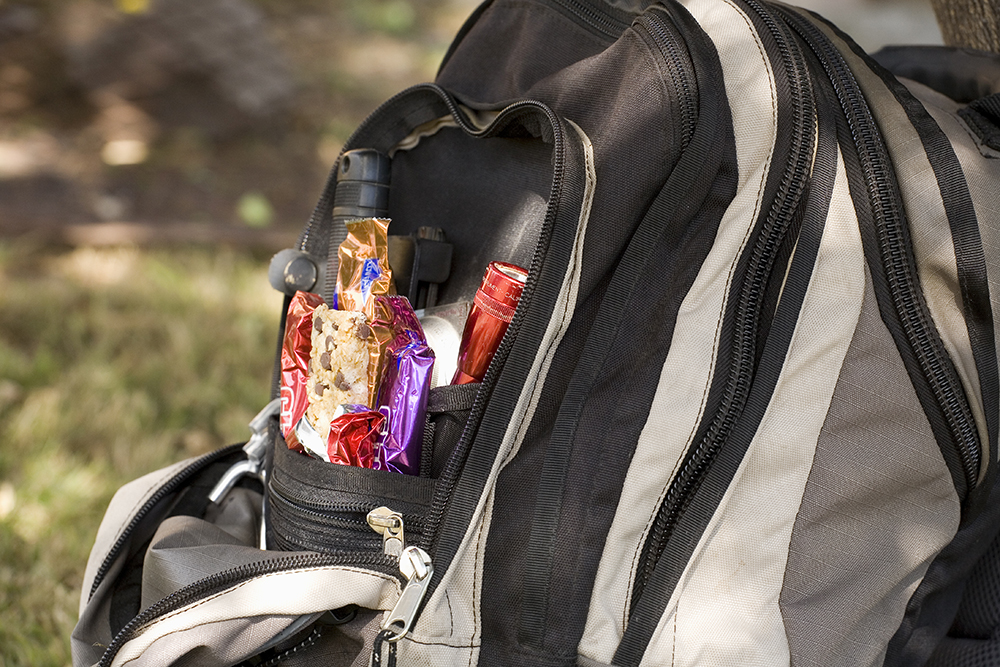
KEEP IT READY
I normally keep at least one pack completely stocked at all times. Yes, it serves as a ready-to-go option for emergency use. But more often I keep it ready simply because I don’t want to start from square one if I decide at the last minute to go on a hike or other outing. As long as you remember to replace items you remove for other purposes, you’re ready for your next adventure on a moment’s notice. Just add water – and perhaps a lunch – and you’re good to go.
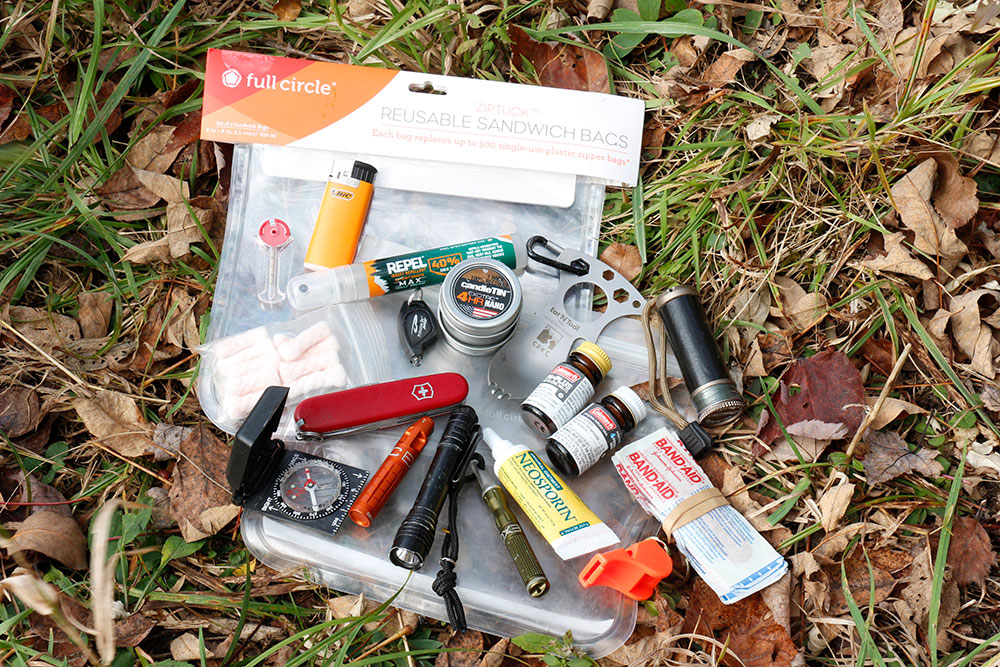
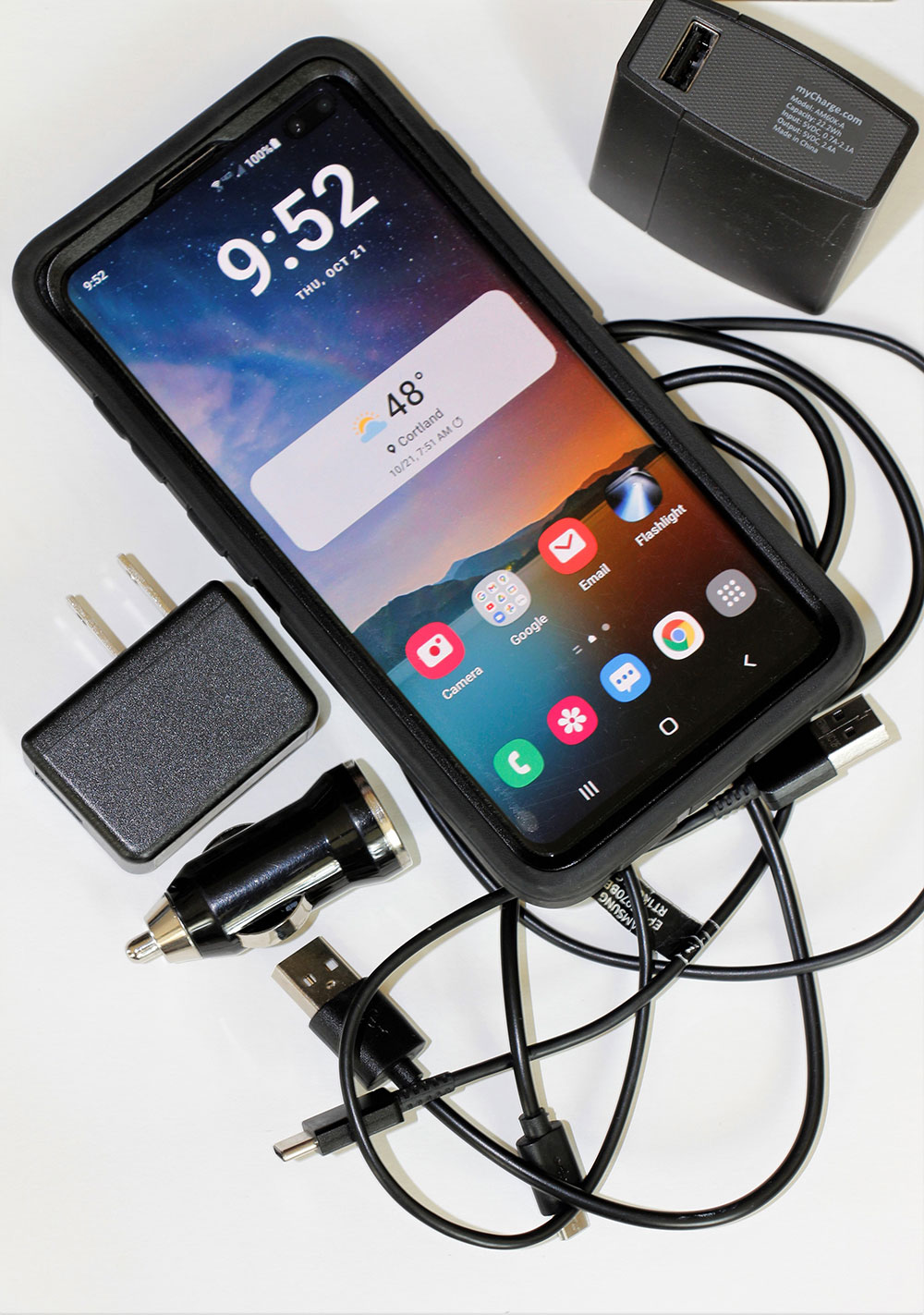
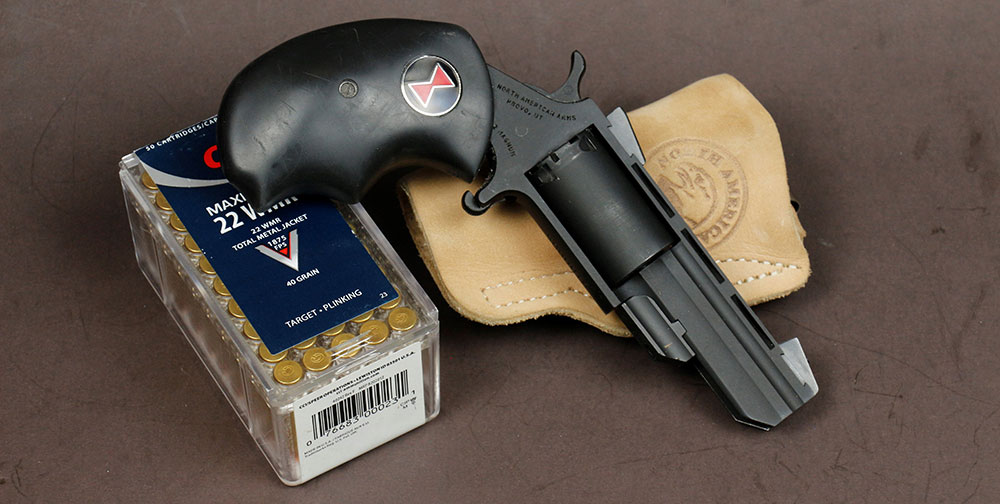
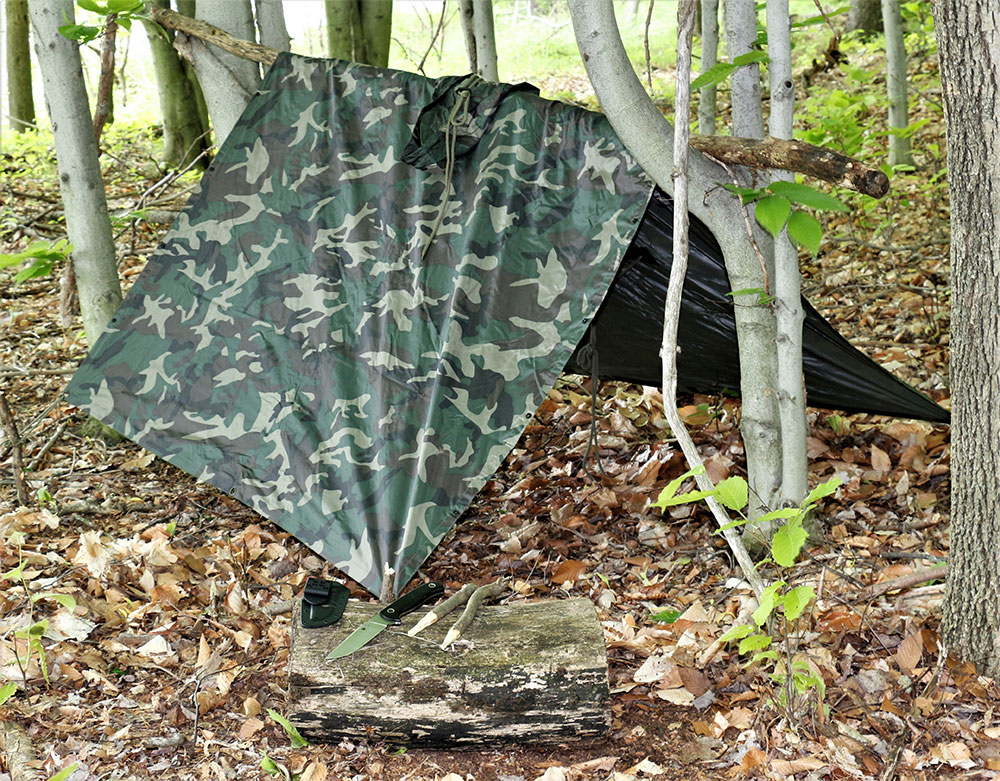
KEEP IT READY
I normally keep at least one pack completely stocked at all times. Yes, it serves as a ready-to-go option for emergency use. But more often I keep it ready simply because I don’t want to start from square one if I decide at the last minute to go on a hike or other outing. As long as you remember to replace items you remove for other purposes, you’re ready for your next adventure on a moment’s notice. Just add water – and perhaps a lunch – and you’re good to go.
SOURCES
Maxpedition
Exotac (fire starters)
Streamlight (flashlights)
Survivor Filter (water filter bottle)
Ozark Trail 18-ounce Steel Cup
Roving Blue Water Purifiers
North American Arms
THE SPECS
Overall Volume:
2,319 cubic inches / 38 liters
Construction:
500-Denier water and abrasion resistant plain weave ballistic nylon fabric, triple polyurethane coated for water resistance
High tensile strength composite nylon thread
Internal seams taped and finished
Stress points double stitched, bartacked or “box-and-X” stitched for added strength
YKK high strength zippers and zipper tracks
MOLLE webbing on front & sides for attaching accessory pockets
Discreet CCW compartment accessible from either side
Loop fields in front for adding morale patches
Side and bottom compression straps
Numerous internal pockets for organization
Curved padded shoulder straps for comfort
Removable and adjustable sternum and waist straps
Field replaceable side release buckles
UTX-Duraflex nylon buckles for low sound closures
Teflon fabric protector for grime resistance and easy maintenance
MSRP: $265.95
LOOK FOR THESE THINGS WHEN CHOOSING A DAYPACK
Here are a few things I look for when choosing a daypack:
- Rugged construction. That usually means heavy duty nylon.
- Enough capacity. Between 30 and 40 liters is good for a mid-sized pack.
- Plenty of pockets. In addition to a large main compartment, I want pockets on the inside to keep small items organized and pockets on the outside to all easy access to often used gear.
- Padded, contoured shoulder straps. You don’t want the straps digging in when carrying a full load.
- Sternum strap. This helps to keep the shoulder straps in position and comfortable.
- Waist strap. This helps to keep the pack in position. Larger packs usually come with a padded hip belt that will carry much of the pack’s weight. That’s not as much of an issue with a smaller pack.
- Reliable zippers. Velcro for outside compartments isn’t good enough.
- Outside attachment points. These allow you to add pouches and attach other gear.
- Compression straps. Normally located along the sides, these keep the pack in a tight, compact package and help to keep things from jostling around when the pack is less than full. But I’ve found them very useful for strapping gear to the outside of the pack. If the pack has straps on the bottom too, this is even better. Bottom straps are great place to secure rolled up bulky items – jacket, raincoat, sleeping bag – that you don’t want or can’t fit inside the pack.
- Water bladder compatibility. I don’t use a water bladder all the time, opting instead for a filter bottle. But it’s nice to have a bladder compartment and a hose port on a pack. Lacking this, I want an outside pocket on the pack that can house a water bottle.
- Top-mounted carry handle. The Maxpedition Havyk-2 Backpack is available in several colors, including black, gray, blue and olive drab.
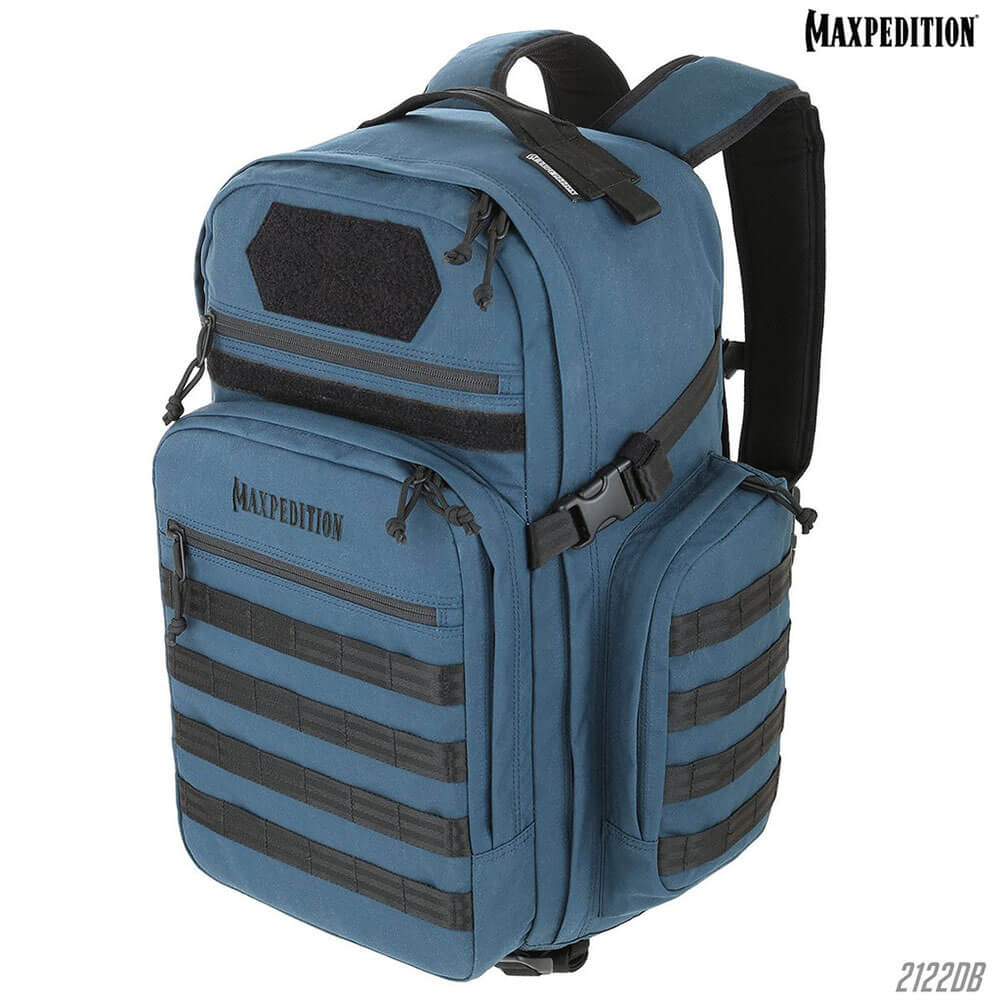
A version of this article first appeared in the March 2022 print issue of American Outdoor Guide.


